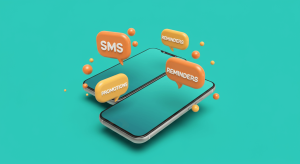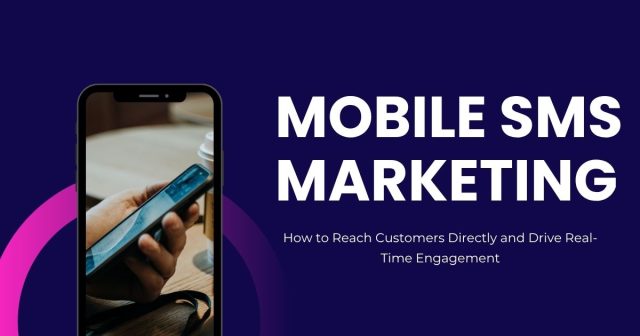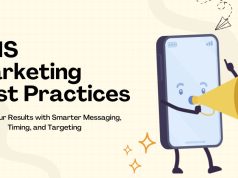Mobile SMS marketing has quietly become one of the most powerful tools in a marketer’s toolkit. With open rates reaching 98% and response rates that dwarf email campaigns, text message marketing offers direct access to your customers’ attention like few other channels can match.
But what exactly is mobile SMS marketing, and why should your business care? This comprehensive guide will walk you through everything you need to know about SMS marketing, from the basics to advanced strategies that can transform your customer engagement.
Whether you’re a small business owner looking to boost sales or a marketing professional seeking new ways to reach your audience, understanding SMS marketing could be the key to unlocking significant growth for your business.
Understanding Mobile SMS Marketing
Mobile SMS marketing is a direct marketing strategy that involves sending promotional messages, alerts, and updates to customers via text messages on their mobile phones. Unlike email or social media marketing, SMS messages are delivered directly to a person’s phone, making them nearly impossible to ignore.
The beauty of SMS marketing lies in its simplicity and immediacy. When you send a text message to a customer, it typically arrives within seconds and is read within three minutes of delivery. This instant communication creates unique opportunities for time-sensitive offers, urgent notifications, and real-time customer service.
SMS marketing campaigns can range from simple promotional offers to sophisticated automated sequences that nurture leads and drive conversions. The key is that customers must opt-in to receive these messages, creating a permission-based marketing channel that respects privacy while delivering results.
Types of SMS Marketing Campaigns

Promotional SMS Campaigns
Promotional text messages are designed to drive immediate action. These might include flash sales, limited-time offers, or exclusive discounts for subscribers. For example, a restaurant might send “Flash Sale: 20% off your order today only. Use code SAVE20. Expires at midnight!”
Transactional SMS Messages
These messages provide important information related to customer transactions. Order confirmations, shipping notifications, appointment reminders, and payment alerts all fall into this category. Transactional messages typically have higher engagement rates because customers expect and want to receive them.
Informational SMS Updates
Informational texts keep customers informed about important updates, new product launches, or company news. These messages build brand awareness and maintain ongoing relationships with your audience without being overly promotional.
Customer Service SMS
Many businesses now use SMS as a customer service channel, allowing customers to get quick answers to questions, resolve issues, or receive support through text messaging.
Key Benefits of Mobile SMS Marketing

Exceptional Open Rates
SMS marketing boasts the highest open rates of any marketing channel. While email open rates typically hover around 20-25%, SMS messages achieve open rates of 98%. This means virtually every message you send will be seen by your recipients.
Immediate Delivery and Response
Text messages are delivered instantly and typically read within minutes. This immediacy makes SMS perfect for time-sensitive communications like flash sales, event reminders, or urgent updates.
High Engagement Rates
SMS campaigns often see response rates between 45% and 60%, significantly higher than email marketing. The personal nature of text messaging encourages recipients to take action quickly.
Cost-Effective Marketing
SMS marketing requires minimal investment compared to traditional advertising channels. The cost per message is typically very low, making it accessible for businesses of all sizes.
Wide Reach Across Demographics
Nearly everyone owns a mobile phone, and text messaging works on all devices regardless of internet connectivity. This universal accessibility makes SMS marketing effective across diverse demographic groups.
Easy Integration
SMS marketing platforms easily integrate with existing CRM systems, e-commerce platforms, and marketing automation tools, making it simple to incorporate into your current marketing stack.
How Mobile SMS Marketing Works

Building Your Subscriber List
Successful SMS marketing starts with building a quality subscriber list. Customers must explicitly opt-in to receive your text messages, typically by texting a keyword to a short code or signing up through a web form. For example, a retail store might display signs saying “Text DEALS to 12345 for exclusive offers.”
Segmentation and Targeting
Once you have subscribers, you can segment your list based on various criteria such as purchase history, location, preferences, or engagement levels. This segmentation allows you to send more relevant, personalized messages that resonate with specific audience segments.
Creating and Scheduling Messages
SMS messages are limited to 160 characters, which forces marketers to be concise and direct. Successful SMS campaigns use clear, action-oriented language with compelling calls-to-action. Messages can be sent immediately or scheduled for optimal timing.
Tracking and Analytics
Modern SMS marketing platforms provide detailed analytics including delivery rates, open rates, click-through rates, and conversion metrics. This data helps optimize future campaigns and measure ROI.
Best Practices for SMS Marketing Success
Respect Frequency Limits
Avoid overwhelming subscribers with too many messages. Most successful brands send 2-4 SMS messages per month, though this can vary based on your industry and audience preferences.
Timing Matters
Send messages during appropriate hours, typically between 9 AM and 8 PM in your recipients’ time zones. Consider your audience’s lifestyle and when they’re most likely to engage with your messages.
Provide Clear Value
Every message should offer clear value to recipients, whether it’s a discount, useful information, or an exclusive opportunity. Avoid sending messages just for the sake of staying in touch.
Make Opting Out Easy
Always include clear opt-out instructions in your messages, typically “Reply STOP to opt out.” Respecting subscribers’ preferences builds trust and maintains compliance with regulations.
Personalize When Possible
Use subscribers’ names and purchase history to create more personalized experiences. Personalized messages typically see higher engagement rates than generic broadcasts.
Keep Messages Conversational
Write SMS messages in a conversational tone that matches your brand voice. Text messaging is inherently personal, so formal corporate language often feels out of place.
Legal Considerations and Compliance
SMS marketing is heavily regulated to protect consumers from spam. In the United States, the Telephone Consumer Protection Act (TCPA) requires businesses to obtain explicit consent before sending marketing text messages. Key compliance requirements include:
- Obtaining clear opt-in consent from subscribers
- Providing easy opt-out mechanisms
- Including your business name in messages
- Maintaining records of consent
- Respecting quiet hours and frequency limits
Similar regulations exist in other countries, such as GDPR in Europe, so it’s essential to understand the legal requirements in your target markets.
Getting Started with SMS Marketing
Choose the Right Platform
Select an SMS marketing platform that offers the features you need, such as automation, analytics, and integration capabilities. Popular options include Twilio, SimpleTexting, and EZ Texting.
Define Your Goals
Clearly define what you want to achieve with SMS marketing, whether it’s increasing sales, improving customer service, or building brand awareness. Having clear goals will guide your strategy and help measure success.
Start Small and Scale
Begin with a simple welcome series for new subscribers, then gradually add more sophisticated campaigns as you learn what works for your audience.
Test and Optimize
Continuously test different message types, timing, and frequency to optimize your results. A/B testing can help identify the most effective approaches for your specific audience.
Transform Your Marketing with SMS
Mobile SMS marketing offers unprecedented access to your customers’ attention, delivering messages that get read, remembered, and acted upon. The combination of high open rates, immediate delivery, and strong engagement makes SMS a powerful complement to any marketing strategy.
Success with SMS marketing comes from understanding your audience, respecting their preferences, and consistently delivering value through every message. Start by building a quality subscriber list, focus on providing genuine value, and always prioritize the customer experience over aggressive selling.
Ready to explore SMS marketing for your business? Begin by researching compliant SMS marketing platforms and developing a strategy that aligns with your broader marketing goals. Remember, the most effective SMS campaigns feel like helpful communications from a trusted friend, not interruptions from a pushy salesperson.









